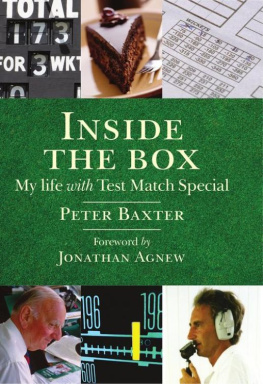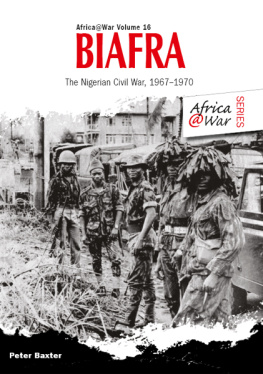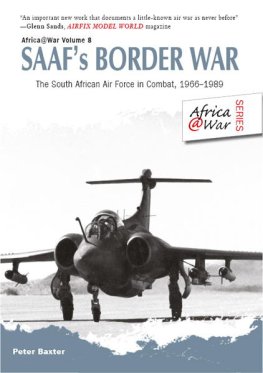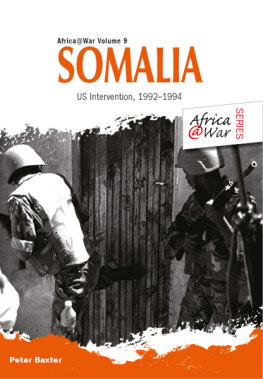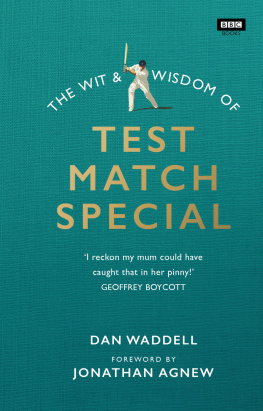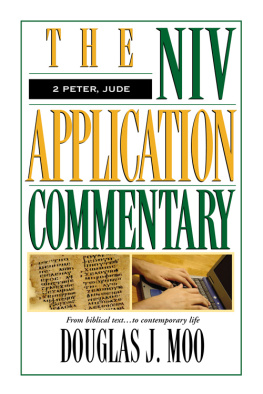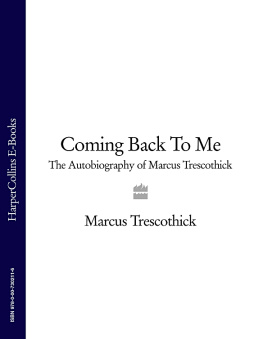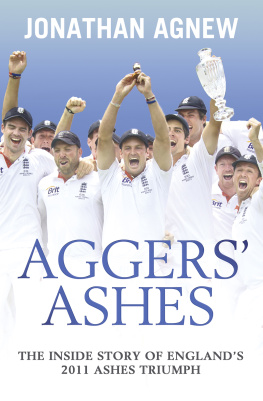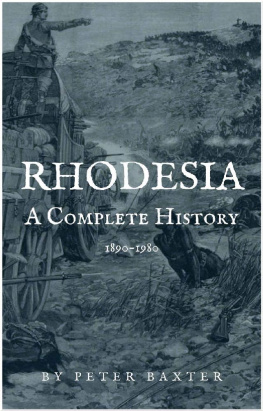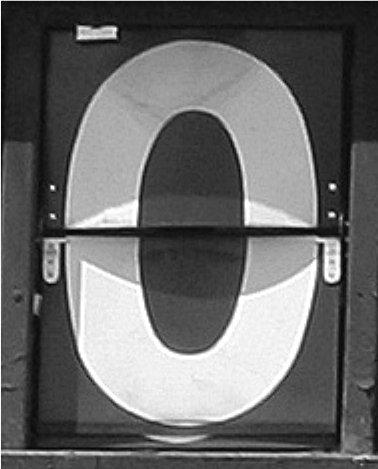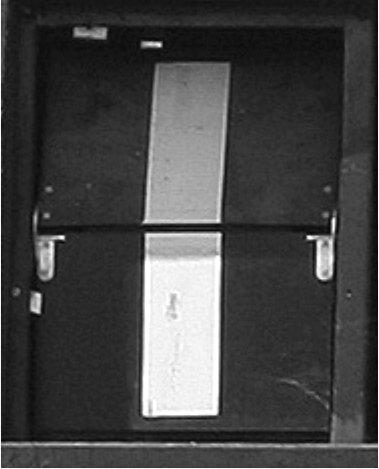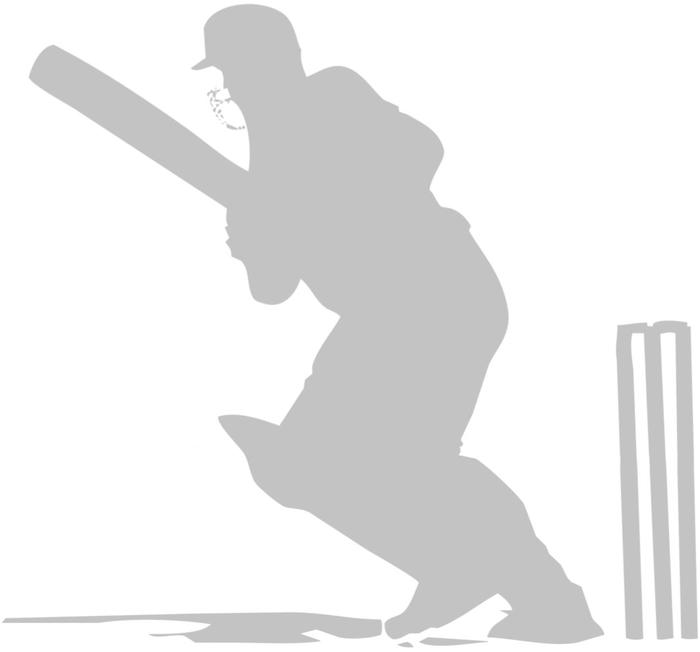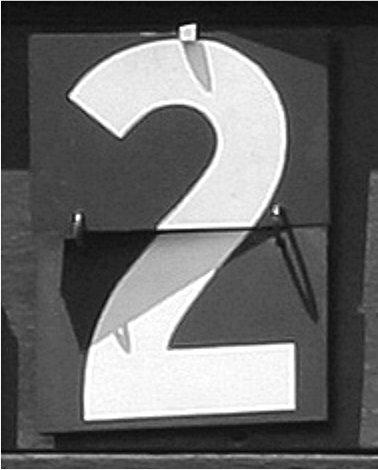I FIND IT RATHER EMBARRASSING NOW TO LOOK BACK and remember just how hard Peter Baxter had to persuade me to apply to succeed Christopher Martin-Jenkins as BBC cricket correspondent. It was during a stroll through Perths beautifully manicured Queens Gardens that Peter finally convinced me that my future lay in broadcasting, rather than writing for the tabloid Today newspaper. He was right, not least because Today went bust a few years later!
That meeting took place in February 1992 and marked the beginning of sixteen years of successful teamwork and great friendship, to the extent that we were each best man at the others wedding.
The relationship between BBC cricket producer and correspondent on long tours away from home is unique. The newspaper writers all operate independently of one another, while Peter and I were a double act, each with our own specific roles. We worked together all day and then, inevitably, met in the bar for a sharpener every evening before moving on to eat: I do not suppose that anyone knows me better than Peter, and vice versa.
It has not always been a barrel of laughs. The moment we were held up by armed bandits on the highway between Calcutta and Jamshedpur was only matched by the sinking realisation at Harare airport that we were about to be led to the cells for the night to await deportation. I was sitting next to Peter when the captain of an eventful Indian Airlines flight announced hysterically that we had landed only by the grace of God and, of course, we share many painful memories of watching England being stuffed in Australia.
I learned quickly that it was wise to maintain a low profile on the day before a Test match on the subcontinent. It would always start promisingly enough as I waved Peter off to the stadium, rather like a mother at the garden gate seeing her child off to school. Darkness would inevitably have fallen long before a crumpled figure returned with tales of woe and utter frustration having battled with local technicians to establish a broadcasting circuit with London. Miraculously, on virtually every occasion, contact was established the following morning, the only memorable exception being a Test match in Calcutta in 1993 where, as Peter gently noted afterwards in his letter of thanks to the local All India Radio office, the broadcast might have been even more successful had just one of the several engineers they generously supplied been able to speak English.
Too often in life one realises how very special something was only after it has gone. Peters gentle (although not necessarily always calm) and low-key attitude to production was such that, once on the air, Test Match Special under his care just seemed to happen by itself. Peter would appear merely to be tinkering about at the back of the commentary box, adjusting the rota or searching for CMJ, but this was his greatest skill. Peter had the nous and the confidence to allow the broadcasters freely to express themselves and to allow their true characters to emerge and to blossom. This probably comes only through experience and Peter was also blessed with a group of established and formidable cricket commentators in his formative years but he encouraged the informal and welcoming atmosphere in which a rather quirky, and definitely niche, radio programme flourished and developed into a broadcasting institution.
It is a mark of the closeness of the family of Test Match Special how keenly we all felt the loss of Bill Frindall early in 2009. He was the one member of the team who had actually been there even longer than Peter himself and the commentary box will not seem the same without him commanding his corner.
Time marches on, of course, and I know just how painful it was for Peter to hand over the baton. He leaves behind an army of grateful and loyal listeners who, with an equally determined correspondent, will strive to ensure that Peters legacy is merely the beginning.
Jonathan Agnew
The Vale of Belvoir, February 2009
I T IS 19 J UNE 2007. I AM STANDING ON THE OUTFIELD of the Riverside Ground at Chester-le-Street, County Durham, on a chilly late afternoon that feels more like autumn than high summer, and my time as the producer of Test Match Special has only minutes to run. In fact, it may already have run its course, because Shilpa, my assistant, has told me that I have to be here for some vague reason when, as the programme producer, I would normally be upstairs keeping an ear on the output and an eye on the clock, to bring the programme off the air smoothly at the right time.
However, this, my final Test match in the TMS saddle, has been full of unexpected happenings. There was a presentation from the International Cricket Council, no less, and Jonathan Agnew ambushed me for an A View From the Boundary interview. Now on my way down to the field of play, where the presentations for the end of the Test series are about to be made, I have had a remarkable number of handshakes and good wishes. To tell the truth, I am getting a little emotional about it all.
Probably the most touching comment of all has been from Nasser Hussain, one of about twenty-five England captains I have dealt with in my time in office, who has gone out of his way to come over to say, Thank you for all youve done for cricket. I was really just the producer, getting the programme on the air somehow.
Aggers is clutching the radio microphone and his few notes, with Vic Marks at his side, and now he is introducing the official presentations, as the Wisden Trophy is handed to Michael Vaughan for Englands decisive victory over the West Indies in the four-match series. Then, after Vaughan has come across to us for an interview, he, too, makes a presentation to me on behalf of the England team.
Finally, I try to get Aggers to present the magnum of Veuve Clicquot for the Champagne Moment. I thought that Paul Collingwood had won it for the moment he reached his century on his home ground, but no, Aggers presents it to me. The Champagne Moment is the moment they get rid of me!
The signature tune, Soul Limbo, starts up and we are away. Back in the London studio, the announcer, Andy Rushton, credits the commentators and says, The producer for the last thirty-four years was Peter Baxter.
And its over.
But how did it happen?
L ATE IN THE SUMMER OF 1966, I FIRST SET FOOT IN the Test Match Special commentary box. I had not quite completed a year on the staff of the BBC when I was sent to the Oval. My task was to carry out the production role at the ground, the job referred to in those days as the No. 2.

